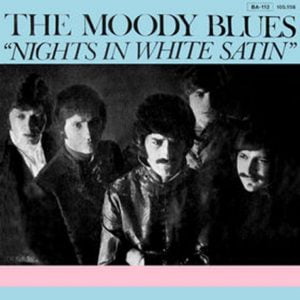July 15, 2022 —– Chart #152
Hello Music Friends,
Have you seen us on Facebook? CLICK HERE to like our page. “Nights in White Satin” is a song by the Moody Blues, written and composed by Justin Hayward. It was first featured as the segment “The Night” on the album Days of Future Passed. When first released as a single in 1967, it reached number 19 on the UK Singles Chart and number 103 in the United States in 1968. It was the first significant chart entry by the band since “Go Now” and its recent lineup change, in which Denny Laine and Clint Warwick had resigned and both Hayward and John Lodge had joined.
When reissued in 1972, the single hit number two in the United States for two weeks on the Billboard Hot 100 (behind “I Can See Clearly Now” by Johnny Nash) and hit number one on the Cash Box Top 100, making it the band’s most successful single in the United States. It earned a gold certification for sales of over a million US copies (platinum certification was not instituted until 1976). It also hit number one in Canada. After two weeks at #2, it was replaced by “I’d Love You to Want Me” by Lobo.
The song enjoyed a recurring chart presence in the following decades. It charted again in the UK and Ireland in 1979 reaching #14 and #8, respectively. The song charted again in 2010, reaching number 51 in the British Official Singles Charts.
Band member Justin Hayward wrote and composed the song at age 19 while touring in Belgium and titled the song after a girlfriend gave him a gift of satin bedsheets. The song itself was a tale of a yearning love from afar, which leads many aficionados to term it as a tale of unrequited love endured by Hayward. Hayward said of the song, “It was just another song I was writing and I thought it was very powerful. It was a very personal song and every note, every word in it means something to me and I found that a lot of other people have felt that very same way about it.”
The London Festival Orchestra provided the orchestral accompaniment for the introduction, the final rendition of the chorus, and the “final lament” section, all of which were in the original album version. The “orchestral” sounds in the main body of the song were actually produced by Mike Pinder’s Mellotron keyboard device, which would come to define the “Moody Blues’s signature sound”.
Live in 2018: https://youtu.be/XOTbnmfSAM8
Keep rockin my friends,
Stan
